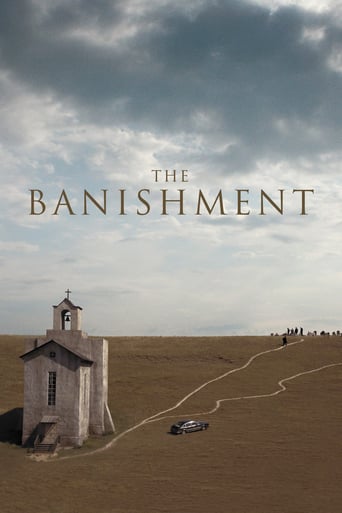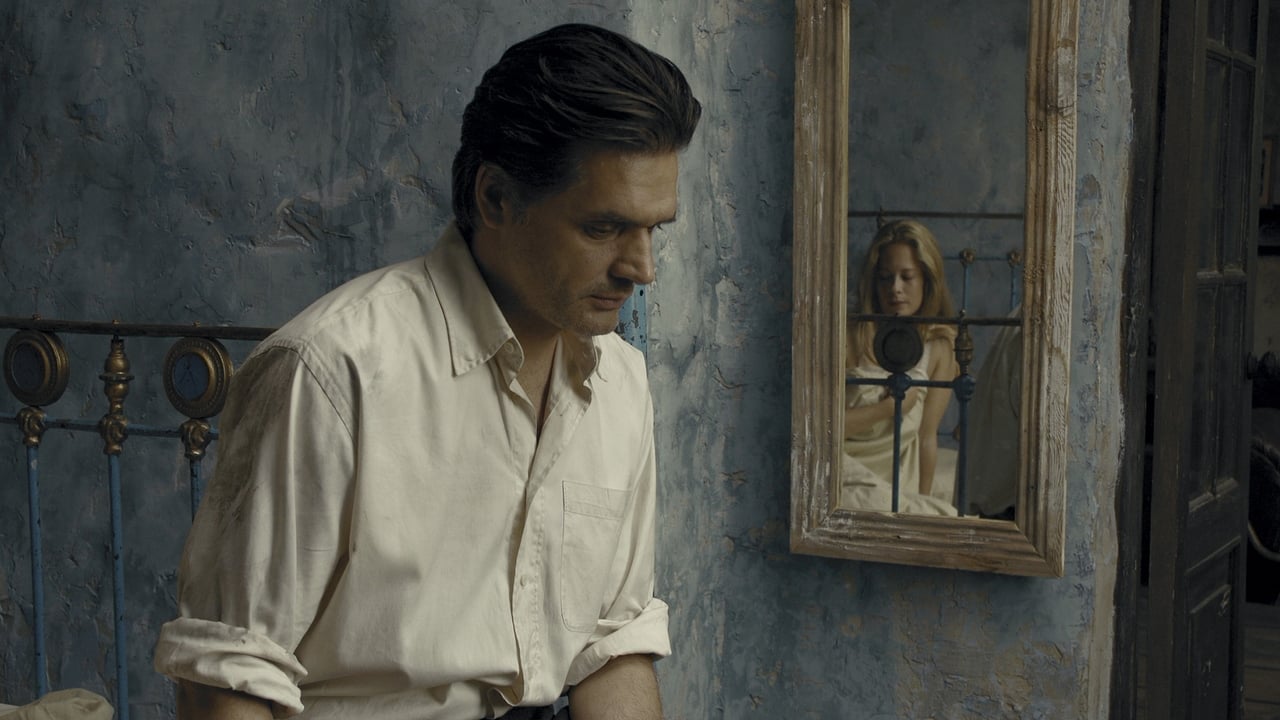tao902
A city family take a holiday in the country, staying at a remote house in the Russian countryside for a. Alex's wife, Vera, reveals to him that she is pregnant by another man. He struggles to decide how he should respond and what should be done, eventually deciding that an abortion should be arranged. His wife kills herself with an overdose immediately after the abortion. However, Alex then finds out that he was in fact the father and that in fact his wife had never felt close enough to him to be able to regard him as a partner.An intriguing story but slow, in the style of Tarkovsky, maybe too long.
johnnyboyz
Andrei Zvyagintsev's gripping drama The Banishment plays out like Eastern Promises meets Carlos Reygadas' 2007 feature Silent Light; a combination of rather embittered Russian criminals operating and uncovering certain revelations around innocents whom later become caught up in the crossfire, with this weighty, steady visual aesthetic of rural land captured by way of long takes and eerie, heavenly music juxtaposing the on screen non-paradise we witness. Zvyagintsev's film is a minor-masterpiece, a film combining the essence of each of the above films with various cues from that of something like Coppola's Godfather films; the studious deconstruction of a family unit, not all of them necessarily criminally minded, slowly; painfully; deathfully falling apart at the seams as those of varying genders, ages and backgrounds fall away from one another because of a troupé of men's actions. It is a rigorously immersive film, a fine effort from a man firing on mostly all the cylinders he decides to shoot from; the end product formulating into a morbidly fascinating procession of drama and character.The film will begin with a car being driven by a wounded man through rural fields split by the tarmac road his car occupies, the trees and birdsong unpleasantly disturbed by the roar of the car as it hares by. After another instance of countryside peace being disturbed, an unperturbed cut will see the car enter a more urbanised locale full of bricked up walls and factory chimneys churning out reams of smoke. The driver is a certain Mark (Baluev), a criminally orientated brother to that of Alex (Lavronenko) who lives in the city; the charging of his car past the calm, peaceful rural world during the opening shots a precursor to the sorts of later shattering of the tranquillity he and the family with whom he shares ties to. The aforementioned jolting cut between peace and countryside to city life additionally highlights a sudden change in surroundings, an example of shifting surroundings for the worse which will additionally go on to encapsulate the framework of the film and the general well-being of a family congregation. Mark is injured, but trusty brother Alex patches him up in the dead of night - his dealing with a bloody, scuzzy; grotty situation highlighting skill of a physical nature in his ability to deal with such a scenario of such a delicate, precise nature; before the film places him into a similar predicament, only of immense psychological and spiritual sorts.With Alex lives his wife Vera (Bonnevie), whom puts up with people of Mark's ilk arriving at her home whilst she sleeps at ungodly hours; when Alex goes to lie next to her, the film providing us with the first of many eerie shots that peer straight down at the couple lying in bed facing upwards at us: very little in the way of contact nor communication and grossly varying positions as they lie situated there, as if not of a similar ilk. Following on from the opening, Alex; Vera and their son Kir with their daughter Eva journey by way of localised train network and by foot through the forests and fields to a farm house. The journey by train is, again, muted; the unit of four sharing varying poses and stances as they sit in the train's compartment avoiding eye contact; the insinuation is disenchantment or a unit not hooked up to one another.The house they arrive at is one Alex appears highly attuned to, later reveals are that he spent time there as a boy with brother Mark; the faces of elderly and long since deceased family members peering through the exterior glass window of their photographic frames as their image hang there, looming over proceedings as they watch on from the walls. The house, of which is seemingly only accessible from the front by way of a narrow wooden bridge over a kind of moat thus inflecting it being cut off from a distinct 'other side', is a peaceful haven set isolated from civilisation amidst the scorched fields and constant sun. The family are not infallible, uncomfortable scenes such as the one that sees Vera argue with her young daughter unravel, whilst the visiting to Alex's family by neighbouring relative Viktor (Sergeev) and his family demonstrate a seemingly perfect, working unit of this nature in full flow as the distinction between his and Alex's appear even greater.The bombshell which ruptures this existing arrives in the form of the announcement of Vera's pregnancy, a pregnancy which Alex is informed wasn't instigated by him. What follows is a slow burning sensation of dread and affliction, perpetrated out of human nature's ill-advised methods in dealing with such situations; a late night seeing off of Vikto and co. whom were visiting seeing Alex occupy a part of the porch to the left side of the screen as a distinct wooden foreground beam splits the frame down the middle, distinctly placing Vera on the other side; the film seeing it now necessary to place a physical object so as to highlight the 'split' from one another the two characters share. Zvyagintsev's film is a fine effort, instilled with an agonising and morbidly captivating air about it as we witness these people and their lives disintegrate out of a man too of-his-ilk to be making decisions whilst influencing another man whom ought to be strong enough to see sense. The contemporary cinematic antithesis to Bekmambetov's Americanised Night Watch, or indeed Bondarchuk's Hollywood war movie simulacrum 9th Company, The Banishment banishes most doubts over the Russian cinema industry's strengths and motifs.
movedout
Andrey Zvyagintsev's "The Banishment" is a stark, grave allegory of marital and familial disintegration. The father, Alexander (Best Actor at Cannes 2007, Konstantin Lavronenko)a slight, lithe, laconic characterfaces an unconscionable choice midway through the film. His wife, Vera (Maria Bonnevie), is a quietly tired mother masking a great deal of uncertainty behind pained eyes and faded beauty. Their young children, Kir and Eva, sense that a storm is brewing. This is Zvyagintsev's despairing poetry on the toxic disconnect between loved ones, surveying the limbo between the way things are and the way it should be."I'm pregnant, but it's not yours," Vera says unhurriedly, looking at her husband imploringly, eyes beseeching, as they lounge on the patio of Alexander's hilltop childhood home in the countryside, far away from the bleak greys of the industrial city where they reside. In that moment, Alexander realises the shift from mental to physical infidelity, less mindful to the betrayal he refuses to talk about than he is to his pride taking a dent. For the first time, the angular complexity of Lavronenko's face twists into a wordless rage that reveals his only response to the malaise rising within this marriage.Alexander meets surreptitiously with his shady brother Mark (Aleksandr Baluyev), a criminal sort that needed stitching up and a bullet removed from his arm in the dead of the night just days before. Mark informs Alexander of a gun he left up in a dresser at their father's home. The moral landscape opens up here with two pathsto forgive or to kill. Both choices demand a hefty price, but remain acceptable as long as one is able to reconcile one's self with it.Zvyagintsev creates a dreary mood piece, sustained with tension and a deeply burdening excavation of secrets and silence. There's an exploration of miscommunication here, not lies. The unspoken becomes just as virulent as falsities; the emotional estrangement between people becomes a source of dehumanising decay. The story of family is timeless in its essence, but intermittent, it's intrinsic morality however, is everything. Once again, the past has a way of rearing itself into the future. Just as Zvyagintsev saw profundity in the role of the Father in his mesmerising debut, "The Return", he sees the same here in the dynamics between parents and of spouses. The themes remain similar, but the religiosity of his enterprise is clunkier and more obtrusive.While the acknowledged influence is Andrei Tarkovskynature and pastoral simplicity as it relates to the inner self and the interplay of religious iconographythe resonance of the camera is plainly Zvyagintsev's. The director, once again working with the cinematographer Mikhail Krichman, seems incapable of framing an ugly image: the open spaces of the golden countryside becomes stupefying and the creaky house itself hinges on a chasm, a solitary wooden bridge is the sole connection to a world outside the confines of family. As the narrative bends and folds, so does Zvyagintsev's virtuosity with visual chicaneryimages and shots blend into one another, revealing the webs of space and time.For all its technical poise, Zvyagintsev's story lacks the emotional veracity of his debut. From each shot, right down to its script, everything is so precisely composed that the film becomes antiseptic beneath the tragedy by justifying its theoretical banality with intense symbolism and inorganic actions. Characters have weight but no realitythey seem becalmed, even unaffectedthey are ideas acted upon, props for a rambling parable and dangerously on the verge of evoking ennui. But in spite of its inherently languorous sermon, Zvyagintsev tackles the film with the cinematic prose of epic literature by enveloping the film with an aura of solemnity and disquiet.
death-hilarious
Much unhappiness has come into the world because of bewilderment and things left unsaid. -- Fyodor Dostoevsky This second feature film from Russian director Andrei Zvyagintsev had a lot to live up to considering how great his 2003 debut, The Return, was. I was really a bit skeptical going in because the advanced reviews had been mixed, and I really didn't know how a director who had made such brilliant use of the Russian landscape as almost a perpetually menacing character in its own right, would handle what sounded like a very indoor domestic drama. Boy was I wrong to doubt. Zvyagintsev and cinematographer Mikhail Krichman find an abundance of interesting things to shoot, from drab constantly overcast soviet-era industrial cities to old decaying farmsteads. I love the way these two frame and light almost every shot and the slow stalking way the camera pans and moves is almost deliberately predatory. I'd probably be mesmerized if these two shot nothing but landscapes and people for two hours with no plot whatsoever, which, to be fair, is what the movie feels like at times, considering how minimal and terse the typically Russian script is. The story revolves around a man (played by Konstantin Lavronenko who also starred in the Return), who moves his wife and two young children from the city to his father's old farm in the country where he expects better prospects for work. While in the country his wife reveals something that threatens to tear the family apart. Like the Return, the Banishment is about the tragic consequences of the failure of individuals to make emotional contact, communicate, and ultimately understand each other. Unfortunately the final denouement, which unravels through a few too many twists for a story this simple and sparse, is really unsatisfying because it strips all the characters of any last shred of sympathy, leaving the audience almost indifferent towards them. Still, this was so brilliantly photographed and paced that I couldn't help but enjoy every shot.


 AD
AD




